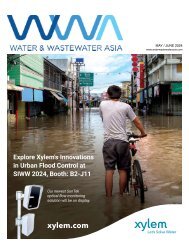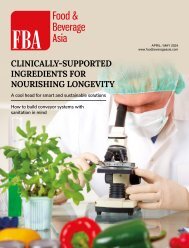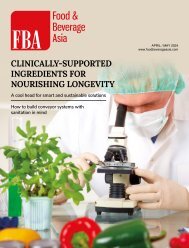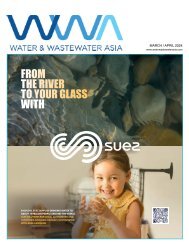Water & Wastewater Asia September/October 2018
Water & Wastewater Asia is an expert source of industry information, cementing its position as an indispensable tool for trade professionals in the water and wastewater industry. As the most reliable publication in the region, industry experts turn this premium journal for credible journalism and exclusive insight provided by fellow industry professionals. Water & Wastewater Asia incorporates the official newsletter of the Singapore Water Association (SWA).
Water & Wastewater Asia is an expert source of industry information, cementing its position as an indispensable tool for trade professionals in the water and wastewater industry. As the most reliable publication in the region, industry experts turn this premium journal for credible journalism and exclusive insight provided by fellow industry professionals. Water & Wastewater Asia incorporates the official newsletter of the Singapore Water Association (SWA).
- No tags were found...
You also want an ePaper? Increase the reach of your titles
YUMPU automatically turns print PDFs into web optimized ePapers that Google loves.
44 | INSIGHT<br />
Making waves in sustainability<br />
and digitalisation<br />
Arcadis recently launched its latest drone deployment services in construction and is one of the first companies to do so in<br />
Singapore. As a leading global design and consultancy firm for natural and built assets with deep market sector insights,<br />
we are excited to hear what Arcadis’s Global Cities Director, John Batten and Global Leader, Intelligent <strong>Water</strong> Networks,<br />
Giles Booth have to say about urban sustainability challenges and Arcadis’ digitalisation journey at this point in time.<br />
Q: Arcadis has been providing<br />
solutions for all kinds of urban<br />
environmental and sustainability<br />
problems, can you point to three<br />
main sustainability challenges in<br />
the water industry that countries<br />
worldwide should give priority<br />
to?<br />
JB: The first has to be water quality.<br />
With urbanisation, industrial migration<br />
and others factors in play, contamination<br />
is always affecting receiving water and<br />
ground water. If you look at PFAs, the<br />
emerging contaminant issue, then you<br />
have challenges of quality even at drinking<br />
water level. <strong>Water</strong> quality continues to be<br />
a challenge and will remain a challenge<br />
as we have more and more emerging<br />
contaminants like PFAs.<br />
The challenge of water quality is<br />
particularly prominent in China, where<br />
major cities have undergone rapid<br />
urbanisation since the country opened its<br />
economy in 1978. The state has recently<br />
identified 21 cities failing to meet the<br />
target of improving the quality of “black<br />
and smelly” water bodies, and that the<br />
country will need US$147 billion to clean<br />
its urban rivers. As evidenced by the case<br />
of China, water quality will not only affect<br />
the health and well-being of its residents<br />
and environment, but also have economic<br />
consequences.<br />
The second issue is resilience. That means<br />
the ability of a city to respond to disruptive<br />
water events like scarcity, floods and<br />
droughts. A city now must have the ability<br />
to live with such fluctuations and events in<br />
water because of climate change, changing<br />
water patterns, sea level rise and political<br />
changes, which are all very real problems<br />
and very much in play. Among the largest<br />
resilience programmes is the sponge city<br />
initiative in China. Sponge city is an innovation<br />
solution to create more green public spaces<br />
to absorb storm water, making the city more<br />
permeable and resilient. Wuhan, the most<br />
populous city in Central China, is one of the<br />
programme’s 16 pilot cities and Arcadis is<br />
honoured to be appointed as the principal<br />
consultant by the Wuhan <strong>Water</strong> Authority for<br />
the city’s programme.<br />
The third is the area of system efficiency in<br />
asset management. In water networks, the<br />
amount of leakage can be significant so the<br />
stability aspect of leakage has a lot to do with<br />
the system too. In water networks, particularly<br />
older ones, the amount of leakages can be<br />
significant, resulting in revenue losses to water<br />
utility. Non-revenue water is something to be<br />
tackled as it leads to a lot of wastage, and<br />
when you consider people who are without<br />
water supply while we are losing that amount<br />
of water from our network, it just doesn’t make<br />
sense. Managing water leakage and driving<br />
down non-revenue water is therefore an<br />
imperative for cities, especially ones dealing<br />
with water scarcity. Singapore’s PUB is a<br />
good example of a city utility that is investing<br />
significantly in tightening up its distribution<br />
system in preventing leakages and breakages.<br />
Q: With governments taking the<br />
lead to seek solutions to manage<br />
such challenges, what can the<br />
private sector in water industries<br />
in <strong>Asia</strong> do to tackle sustainability<br />
issues?<br />
JB: You have the Dow Jones sustainability<br />
index, which is your corporate social<br />
responsibility from an environmental view,<br />
tracking the stock performance of the world’s<br />
leading companies in terms of economic,<br />
environmental and social criteria. More<br />
investors are now paying attention, as there<br />
are growing expectations from shareholders<br />
for companies to be more environmentally<br />
sensitive and responsible, so that trend is the<br />
global trend.<br />
Q: In some developing countries,<br />
the priority is to solve more<br />
immediate water problems such<br />
as water supply and drinking water<br />
quality, not sustainability. Is it<br />
possible to still bring sustainability<br />
issues to their table?<br />
JB: Sustainability does come at a cost. When<br />
you do the cost benefit analysis, I think that<br />
sustainability, in the long run, is a good<br />
investment because it improves quality of<br />
life to make a city a better place to live in.<br />
Liveability is a big issue in <strong>Asia</strong>, investing<br />
in sustainability and liveability is a priority<br />
on both public and private sector level.<br />
The two definitely should join up and work<br />
together to create sustainable outcomes.<br />
By prioritising urban sustainability, a city’s<br />
water environment directly benefits from that<br />
investment.<br />
Q: Are there any challenges<br />
implementing it in SEA?<br />
<strong>Water</strong> & <strong>Wastewater</strong> <strong>Asia</strong> • <strong>September</strong> / <strong>October</strong> <strong>2018</strong>


















